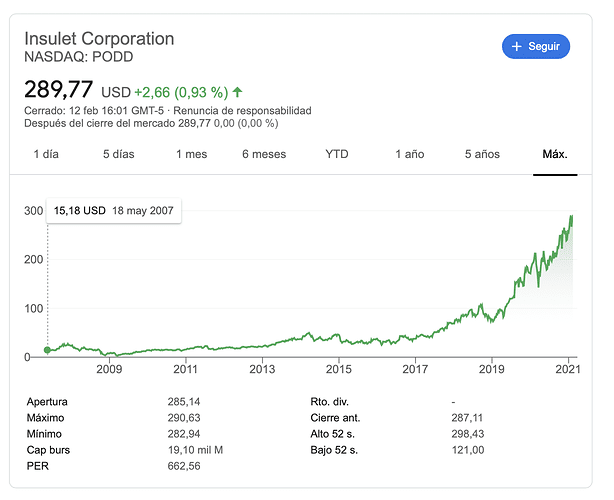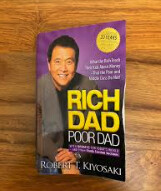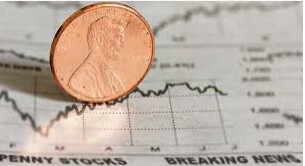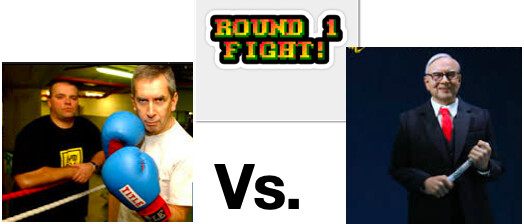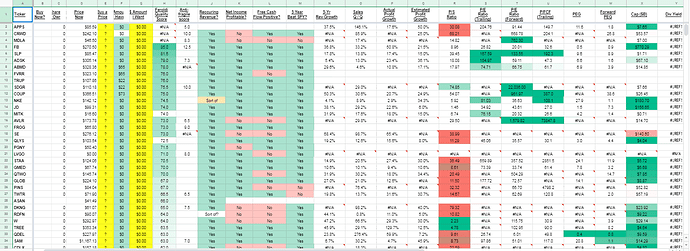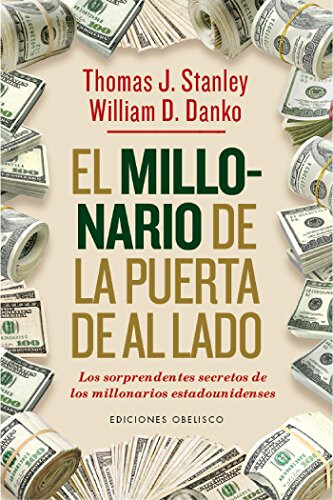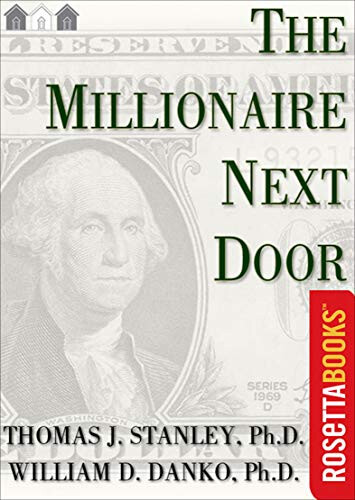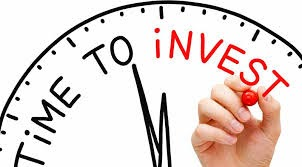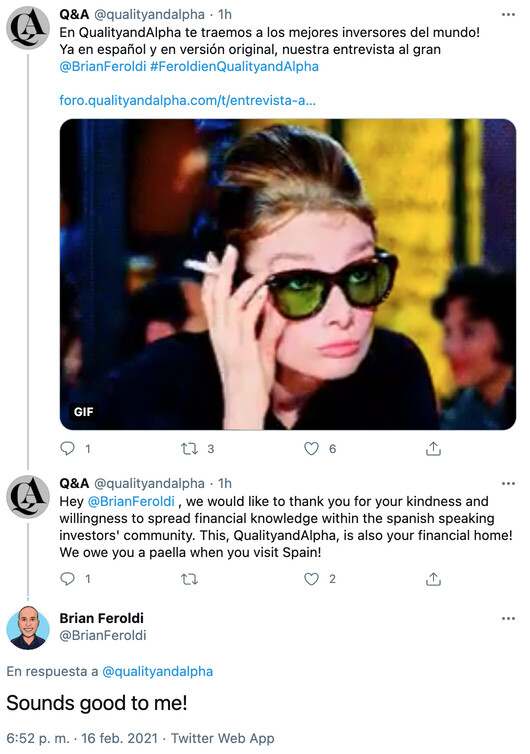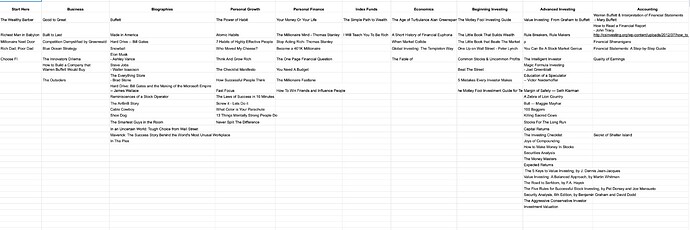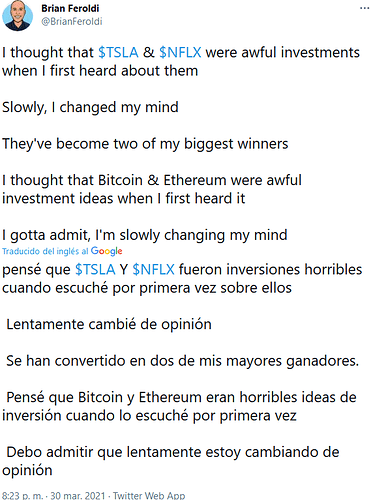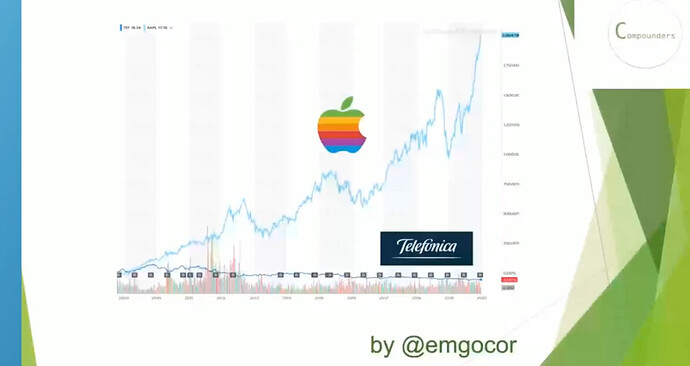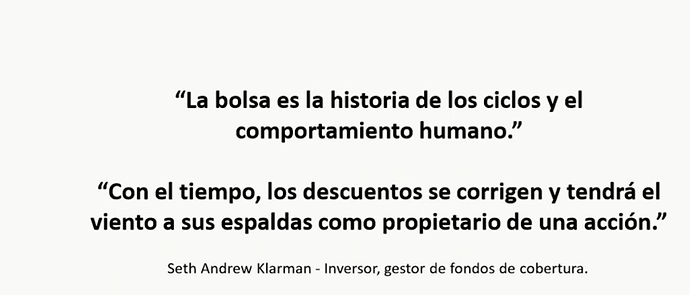Estimado Brian Feroldi, te seguimos en Twitter y en The Motley Fool, donde algunos de nosotros somos suscriptores. Apreciamos realmente tu esfuerzo y tu compromiso por difundir la Educación Financiera, que es nuestra misión en Quality and Alpha. Dentro de nuestra comunidad tenemos una amplia gama de inversores, desde inversores en valor hasta inversores en crecimiento, y de verdad apreciamos tu tiempo y amabilidad.
Estas son las preguntas formuladas por la comunidad:
English version
Brian, we follow you on twitter and on The Motley Fool, where some of us are subscribers. We really appreciate your effort and your commitment to spread the Financial Education, which is our mission on Quality and Alpha. We have a huge range of investors, from value to growth and we really appreciate your time and your kindness. These are the questions asked by the community:
 Cuéntanos algo sobre ti, edad, lugar de nacimiento y estudios.
Cuéntanos algo sobre ti, edad, lugar de nacimiento y estudios.
Vivo en Rhode Island, que es un pequeño estado de Nueva Inglaterra. He vivido en esta zona la mayor parte de mi vida.
Algunas conocidas atracciones turísticas y el escudo de Rhode Island
Fui a la Universidad de Connecticut y estudié negocios con especialización en el sector salud. Me gradué en 2004 y comencé a trabajar para una startup de dispositivos médicos llamada Insulet. Fue un golpe de suerte comenzar así mi vida laboral porque esa empresa ahora cotiza en bolsa y tiene un valor de $ 19 mil millones.
Gráfica de Insulet Corporatio. La 100 bagger de Feroldi.
Trabajé allí durante más de una década en ventas y pasaba más de 30 horas a la semana en el coche. Eso me dio tiempo para estudiar y aprender todo lo que sé hoy sobre dinero, finanzas personales e inversiones. Pasé mucho tiempo en los foros de debate de The Motley Fool y me apasionaba la inversión. Empecé a escribir para Motley Fool a tiempo completo en 2015.
English version
 Tell us something about yourself, age, place of birth and studies?
Tell us something about yourself, age, place of birth and studies?
I live in Rhode Island, which is a small state in New England. I’ve liven in this area for most of my life. I went to the University of Connecticut and studied business with a concentration in healthcare.
Some well-known tourist attractions and the Rhode Island coat of arms
I graduated in 2004 and started working for a startup medical device company called Insulet. It was a very lucky break in my early working life because that company is now publicly traded and worth $19 billion.
Insulet Corporatio Graphics. Feroldi’s 100 bagger.
I worked there for over a decade in sales and spend 30+ hours a week in my car. That gave me the time to teach myself everything that I know today about money, personal finance, and investing. I spent a lot of time on the Motley Fool’s discussion boards and just became very passionate about investing. I started to write for the Motley Fool full time in 2015.
 ¿Cuáles son tus aficiones?
¿Cuáles son tus aficiones?
Pasar el rato con mis amigos y familiares. Soy voluntario en la escuela de mis hijos. Me gusta ver a mis hijos practicar deportes y jugar juegos de todo tipo (juegos de mesa, videojuegos). También disfruto caminar, correr, hacer snowboard y hacer yoga.
English version
 What are your hobbies?
What are your hobbies?
Hanging with my friends and family, volunteering at my kid’s school, watching my kids play sports, and playing games of all types (board games, video games). I also enjoy walking, running, snowboarding, and yoga.
 ¿Cuál fue tu primer contacto con el mundo de las inversiones? ¿Cuál fue tu primera inversión?
¿Cuál fue tu primer contacto con el mundo de las inversiones? ¿Cuál fue tu primera inversión?
El primer libro que leí fue “Padre rico, padre pobre”. Me abrió los ojos al mundo de las inversiones. No tenía idea de lo que estaba haciendo, así que empecé negociando “penny stocks”. Algunas operaciones funcionaron y otras no. Aprendí rápidamente que se deben evitar las “penny stocks”.
Portada de “Padre rico, Padre pobre” e imagen de un penique como representación de un “chicharro” o “penny stock”
English version
 What was your first contact with the investment world? What was your first investment?
What was your first contact with the investment world? What was your first investment?
The first book I read was “Rich Dad, Poor Dad”. It opened my eyes to the world of investing. I had no idea what I was doing, so I traded penny stocks. Some worked out, others didn’t. I learned fast that penny stocks should be avoided.
“Rich Dad, Poor Dad” Cover and an image of a penny as a representation of a “penny stock”
 ¿Cómo aprendiste a invertir?
¿Cómo aprendiste a invertir?
Leyendo libros, escuchando audiolibros, y conversando con otros inversores a través de The Motley Fool. Y por el método ensayo-error.
English version
 How did you learn to invest?
How did you learn to invest?
Reading books, listening to audio books, connecting with other investors through the Motley Fool, and trial and error.
 ¿Buffett o Terry Smith?
¿Buffett o Terry Smith?
Ambos son geniales. Pero si tuviera que elegir uno para administrar mi dinero hoy, sería Terry Smith, ya que tenemos estilos de inversión similares.
Duelo de Titanes
English version
 Buffett or Terry Smith??
Buffett or Terry Smith??
Both are great. If I had to choose one to manage my money today, it would be Terry Smith. We have similar investing styles.
Battle of giants
 ¿Cuál es tu FAANG favorito? o FAANGMAT?
¿Cuál es tu FAANG favorito? o FAANGMAT?
Amazon, es una máquina de innovar.
English version
 Which is your favorite FAANG? or FAANGMAT?
Which is your favorite FAANG? or FAANGMAT?
Amazon. That company in an innovation machine.
 ¿Cómo definirías tu estilo de inversión?
¿Cómo definirías tu estilo de inversión?
Busco acciones de alta calidad, bajo riesgo y alto crecimiento. Estoy perfectamente feliz de cambiar el potencial alcista por calidad. Filtro empresas utilizando mi “checklist” y luego pongo mi capital a trabajar en aquellas empresas que obtienen mejores resultados:
- Un amplio y creciente MOAT ⬚
- Crecimiento potencial orgánico ⬚
- Alto margen ⬚
- Balance fuerte y sin deuda ⬚
- Buen retorno sobre el capital ⬚
- FCF creciente ⬚
- Beneficios crecientes ⬚
- Poder de fijación de precios ⬚
- Muchas alternativas para el futuro ⬚
- Un management con visión de largo plazo y preocupación por la compañía ⬚
- Insiders con alto porcentaje de participación ⬚
- Gran lugar para trabajar ⬚
- Boca a oreja como herramienta de marketing ⬚
- Ingresos recurrentes ⬚
- Apalancamiento operativo a punto de empezar a funcionar ⬚
- Fuerte apreciación en bolsa durante los últimos años ⬚
English version
 How would you define your investment style?
How would you define your investment style?
I look for high-quality, low-risk, high-growth stocks. I’m perfectly happy to trade upside potential for quality. I screen companies using my detailed checklist and then put my capital behind the companies that score the best:
- A wide and expanding moat ⬚
- Lots of organic growth potentialo ⬚
- A high gross margin ⬚
- A strong balance sheet ⬚
- Good returns on capital ⬚
- Growing free cash flow and earnings ⬚
- Pricing power ⬚
- Multiple futures/lots of optionality ⬚
- A management team that cares deeply about company’s mission and long-term health of the business ⬚
- High levels of inside ownership ⬚
- A great place to work ⬚
- Customer acquisition primarily occurs through word of mouth ⬚
- Lots of recurring revenue ⬚
- Operating leverage that is about to kick in ⬚
- Strong past price appreciation (Winners keep on winning) ⬚
 ¿Has evolucionado con el tiempo?
¿Has evolucionado con el tiempo?
Mucho. Comencé con acciones “penny-stocks”, luego pasé a acciones de alto dividendo, después a acciones internacionales, más tarde a acciones de valor, seguidamente a acciones de crecimiento y posteriormente a acciones de pequeña capitalización. Tuve muchos fracasos en el camino. Desde entonces, he aprendido que mi estilo es ser dueño de buenas empresas durante mucho, mucho tiempo.
El largo plazo y el crecimiento
English version
 Has it evolved over time?
Has it evolved over time?
Greatly. I started with penny stocks, then high dividend stocks, then international stocks, then value stocks, then growth stocks, then small caps. I had lots of failures along the way. I’ve since learned that my style is to just own great companies for a long, long time.
The long term and growth
 ¿Inversión en dividendos crecientes o inversión en “Compounders”? ¿Qué estrategia encaja mejor con su estilo?
¿Inversión en dividendos crecientes o inversión en “Compounders”? ¿Qué estrategia encaja mejor con su estilo?
No me fijo en los dividendos. Me enfoco en empresas excelentes con buenas perspectivas a largo plazo. Si pagan dividendo, genial; y si no, igualmente genial.
“Me enfoco en empresas excelentes con buenas perspectivas a largo plazo. Si pagan dividendo, genial; y si no, igualmente genial.”
English version
 Dividend growth investing or select compounders? Which strategy matches better?
Dividend growth investing or select compounders? Which strategy matches better?
I don’t focus on dividends. I focus on great companies with good long-term prospects. If it pays a dividend, great. If not, great.
“I focus on great companies with good long-term prospects. If it pays a dividend, great. If not, great.”
 ¿A qué parámetros le das más importancia a la hora de seleccionar empresas?
¿A qué parámetros le das más importancia a la hora de seleccionar empresas?
“Moat” - foso defensivo, opcionalidad, márgenes, el “management”, y la cultura de la empresa.
English version
 What parameters do you give more importance to when selecting companies?
What parameters do you give more importance to when selecting companies?
Moat, optionality, margins, management, culture.
 ¿Podrías hablarnos de una oportunidad de inversión que existe hoy?
¿Podrías hablarnos de una oportunidad de inversión que existe hoy?
Semler Scientific es una de mis ideas favoritas. El mayor aspecto negativo es la concentración de clientes, pero todo lo demás tiene muy buena pinta. Detalles:
“Semler Scientific es una de mis ideas favoritas”
6 Best Healthcare Stocks to Buy in 2025 | The Motley Fool
English version
 Could you tell us about an investment opportunity that exists today?
Could you tell us about an investment opportunity that exists today?
Semler Scientific is one of my favorite ideas. The biggest negative is customer concentration, but everything else looks good. Details: 6 Best Healthcare Stocks to Buy in 2025 | The Motley Fool
“Semler Scientific is one of my favourite ideas”
6 Best Healthcare Stocks to Buy in 2025 | The Motley Fool
 ¿Qué inversores o gestores han sido tu mayor influencia?
¿Qué inversores o gestores han sido tu mayor influencia?
David Gardner, Tom Gardner, Jeff Fischer, Brian Stoffel y Tom Engle. Los encontré todos a través del Motley Fool.
English version
 Which investors or managers have been your greatest influence?
Which investors or managers have been your greatest influence?
David Gardner, Tom Gardner, Jeff Fischer, Brian Stoffel, Tom Engle. I found them all through the Motley Fool.
 ¿Cuáles son tus libros favoritos? ¿Tienes un autor de referencia sobre inversión?
¿Cuáles son tus libros favoritos? ¿Tienes un autor de referencia sobre inversión?
¡Demasiados para nombrarlos todos! Me quedo con The Millionaire Next Door de Thomas Stanley. Todo el mundo debería leer ese libro.
English version
 Which are your favorite books? Do you have a reference author on investment?
Which are your favorite books? Do you have a reference author on investment?
Too many to name! I’ll got with The Millionaire Next Door by Thomas Stanley. Everyone should read that book.
 ¿Cuándo crees que es obligatorio vender una compounder?
¿Cuándo crees que es obligatorio vender una compounder?
¡Cuando está claro que esa empresa ha dejado de ser excelente!
English version
 When do you think it’s mandatory to sell a compounder?
When do you think it’s mandatory to sell a compounder?
When it’s clear that the company is no longer great!
 ¿Has tenido una mala racha o un momento difícil en los mercados?
¿Has tenido una mala racha o un momento difícil en los mercados?
Muchas veces. No es normal que tus inversiones solamente suban. El último año ha sido extraño. He tenido un rendimiento inferior durante un tiempo, pero tengo claro que así es como funciona la inversión. Uno no debe esperar hacerlo bien todo el tiempo.
English version
 Have you had a bad streak or a difficult moment in the markets?
Have you had a bad streak or a difficult moment in the markets?
Lots of times. It’s not normal for your investments to go straight up. The last year has been weird. I’ve underperformed for a while, but I know that’s how investing works. You shouldn’t expect to do well all the time.
 Tu mejor acción hasta la fecha ¿Cuál es tu percepción del mercado en este momento?
Tu mejor acción hasta la fecha ¿Cuál es tu percepción del mercado en este momento?
Ha habido una gran subida y no tengo prisa por invertir. Estoy acumulando efectivo en este momento. Sin embargo, siempre hay buenas empresas para comprar.
English version
 Your best action to date. What is your perception of the market at the moment?
Your best action to date. What is your perception of the market at the moment?
It’s had a great run, and I’m not in a rush to invest. I’m building cash right now. However, there are always great companies to buy.
 ¿Qué consejo le darías a alguien que quiera empezar a invertir?
¿Qué consejo le darías a alguien que quiera empezar a invertir?
¡Qué empiece ya! Que vaya invirtiendo su dinero en un fondo indexado simple y que haga aportaciones mensuales. Y a medida que aprenda más, comience a incorporar capas de acciones individuales que le gusten. Y que no tengan prisa, invertir es un proceso para toda la vida.
“A alguien que empieza le diría que empiece cuanto antes, que vaya invirtiendo su dinero en un fondo indexado simple y que haga aportaciones mensuales.”
Ahora es la hora de invertir
English version
 What advice would you give to someone who wants to start investing?
What advice would you give to someone who wants to start investing?
Start! Get your money in a simple index fund and add monthly. As you learn more, begin to layer in individual stocks that you like. Don’t be in a rush. Investing is a life-long game.
“Start! Get your money in a simple index fund and add monthly”
Now is the time to invest
 ¿Cuáles son tus proyectos a corto y largo plazo?
¿Cuáles son tus proyectos a corto y largo plazo?
¡Promover la riqueza financiera! Esa es mi misión en la vida. Estoy creando todo el contenido que puedo en diversas fuentes para ayudar a las personas a poner en orden sus finanzas. La mayoría de los proyectos son de naturaleza a corto plazo (podcasts, vídeos), pero también estoy desarrollando algunos proyectos a largo plazo.
English version
 What are your short and long term projects?
What are your short and long term projects?
Spreading financial wellness! It’s my mission in life. I’m creating as much content as I can on a variety of sources to help people get their finances in order. Most projects are short-term in nature (podcasts, video streams), but I do have a few long-term projects in the works.
 ¿Cuáles crees que son las disciplinas más importantes para tener éxito como inversor?
¿Cuáles crees que son las disciplinas más importantes para tener éxito como inversor?
Ahorrar consistentemente. Si ahorra 1,000USD al mes y obtiene solamente un rendimiento del 5%, estará años luz por delante de alguien que ahorra 100 USD al mes y obtiene un rendimiento del 15%.
English version
 What do you think are the most important disciplines to be successful as an investor?
What do you think are the most important disciplines to be successful as an investor?
Consistently saving money. If you save $1,000/month and only earn a 5% return, you’ll be lightyears ahead of someone that saves $100/month and earns a 15% return.
 ¿Cuándo venderá TESLA?
¿Cuándo venderá TESLA?
Cuando está claro que la empresa ya no sea excelente.
“No tengan prisa, invertir es un proceso para toda la vida”
 ¿Por qué es Tesla mejor que Volkswagen?
¿Por qué es Tesla mejor que Volkswagen?
Hay muchas razones. La mayoría de ellas están explicadas aquí:
English version
 Why is Tesla better than Volkswagen?
Why is Tesla better than Volkswagen?
There are lots of reasons. Most of them are covered here:
10 Reasons to Buy Tesla Inc Stock and Never Sell | The Motley Fool

